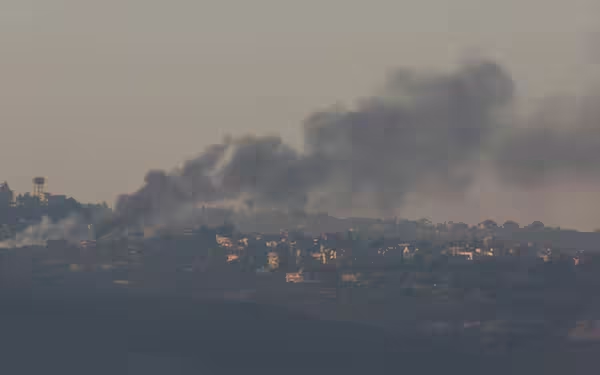Saturday, October 5, 2024 10:31 PM
Israeli Airstrike Closes Vital Escape Route from Lebanon
- Israeli airstrike closes road used by fleeing civilians.
- Over 300,000 individuals have crossed into Syria recently.
- Humanitarian crisis deepens amid escalating conflict.
 Image Credits: brecorder
Image Credits: brecorderAn Israeli airstrike near the Masnaa border has closed a vital escape route, exacerbating the humanitarian crisis amid escalating conflict.
In recent days, the conflict between Israel and Hezbollah has escalated dramatically, leading to significant humanitarian concerns in the region. On Friday morning, an Israeli airstrike near the Masnaa border crossing with Syria resulted in the closure of a crucial road that had been used by many fleeing the violence. This road was vital for hundreds of thousands of people, primarily Syrians, who sought refuge from the ongoing Israeli bombardments.
Lebanon's Transport Minister, Ali Hamieh, reported that the strike created a large crater, measuring four meters wide, within Lebanese territory. The Israeli Defense Forces (IDF) have accused Hezbollah of utilizing this crossing to transport military supplies, asserting their commitment to preventing any smuggling activities. IDF spokesman Avichay Adraee emphasized, "The IDF will not allow the smuggling of these weapons and will not hesitate to act if forced to do so, as it has done throughout this war." This statement underscores the tense atmosphere as both sides prepare for potential escalations.
According to Lebanese government statistics, over 300,000 individuals have crossed into Syria in the past ten days, fleeing the intensifying conflict. The situation has raised alarms about the possibility of broader regional involvement, particularly concerning the United States and Iran. U.S. President Joe Biden expressed his belief that an "all-out war" in the Middle East could be avoided, despite the ongoing hostilities. He acknowledged the need for diplomatic efforts to prevent further escalation, stating, "I think we can avoid it." However, he also indicated that discussions regarding Israel's response to Iran's actions were ongoing.
As the conflict continues, airstrikes have intensified, particularly in areas known to be strongholds of Hezbollah. Reports indicate that Israeli forces targeted key figures within the group, including Hashem Safieddine, who is rumored to be a successor to the assassinated leader Hassan Nasrallah. The fate of Safieddine remains uncertain, adding to the tension in the region.
Hezbollah has retaliated by launching rockets towards Israel, claiming to target military installations. Israeli Prime Minister Benjamin Netanyahu has vowed that Iran will face consequences for its actions, while Iranian officials have warned of a decisive response to any military aggression. The situation remains fluid, with both sides engaged in a dangerous game of escalation.
As the conflict unfolds, the humanitarian impact is becoming increasingly dire. With over 1.2 million Lebanese displaced and nearly 2,000 lives lost since the beginning of the Israeli attacks, the need for a resolution is urgent. The international community is watching closely, hoping for a diplomatic solution that can bring an end to the violence and allow for the safe return of displaced individuals.
The ongoing conflict between Israel and Hezbollah highlights the fragility of peace in the region. As both sides prepare for potential escalations, the humanitarian crisis continues to deepen. It is crucial for global leaders to engage in meaningful dialogue to prevent further loss of life and to seek a sustainable resolution that addresses the underlying issues fueling this conflict.













